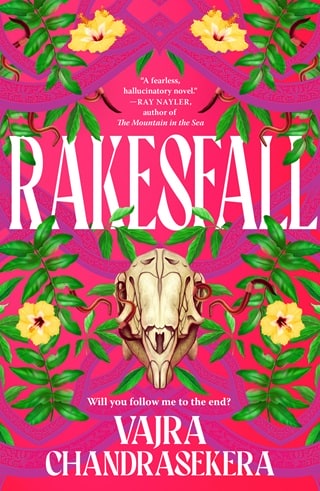Chapter 24 Kingdom of the Birds
They never gave her a name; when she needs one, she names and renames herself after the birds she sees from the watchtower, the birds she sees in the forest, whichever most recently caught her eye or arrow. When the seabirds are flying, when she's riding the moment like air, she signs the telegraph as Petrel or Shearwater or Cormorant; otherwise she might be Pelican or Parrot or Crow or Pochard, or any of a thousand others. When she takes on a name, she feels something of the bird settle over her like a cloak, something of its shape or nature. When she's Darter, she feels sharp and sinuous. She likes to be Spoonbill or Ibis, wise and at peace. She tries not to be Bittern or Egret, or worst of all, Heron, the black-crowned night Heron, red-eyed and still and poised for sudden violence.
But the name doesn't matter. She is the last human ambassador to the kingdom of the birds: the dinosaurs have claimed the empty Earth again, and they don't care what she calls herself. There is only one of her, by any name.
Sometimes when being the only one becomes too loud, when it echoes and reverberates until it becomes hard to think about anything else, Egret wishes she had made graves to visit. She didn't give her teammates/siblings/otherselves proper funerals; she has very confused memories about what a funeral should be. She built clumsy pyres and tried to say ghost prayers in dead languages, but she couldn't remember most of the words and she didn't dare look it up in the ubik because then the Sentimentals would want to know what she was doing. Or perhaps they already knew and were waiting to see how it would play out. It's exhausting to try to outthink godlike posthumans—she's come around to the idea that the only rational response is to annoy them as much as possible. When the absence becomes deafening, Petrel rides the moment out, holding herself stiff and still.
The kingdom of the birds is green and full of noise. The kingdom of the birds is blue and white, rain made clean by generations of bots, now softly decaying on seabeds, crunching like sand on beaches.
(Ibis is puzzled by the tracks in the mud at the forest border south of the watchtower. She can't place the species.)
The fluidity of her naming doesn't seem to make any difference to the Sentimentals upstation. The funding ran out years ago. There was still black in Bittern's pelt when the funding ran out. The funding ran out like oil, and her pelt is grey now. The Sentimentals are no longer tracking her key performance indicators. It's all gone pro bono. It's all gone extraordinary circumstances. It's all gone compassionate retirement. They are making the best of it. They probably think the different signatures are from the other members of Shearwater's team. They probably think the rest of the team is still alive. Anyway, Spoonbill sometimes attaches environment reports that are probably still useful to them. From the perspective of the Working Group on the Preservation of the Ancestral Earth for Sentimental Reasons, the project was very successful, marred only a little by the team's insistence on staying behind at the end. It's possible the Sentimentals didn't have an exit strategy. They're not very good at exit strategy. Their entire ethos is tilting at windmills.
(The mud is hardened, so the tracks are probably about a week old. The monsoon's been and gone.)
Petrel's team travelled to Earth, in one sense; in another, they were made here. The Sentimentals folded spacetime to place a seed in Earth's soil from an unimaginable distance; if there had been anyone to see it, they would have seen it simply appear, displacing exactly enough gravel and air that it did not register as an arrival, but simply as a break in continuity. The seed flowered into a swarm of bots, fewer and more specialized than the ones that had already worked for so long on the regreening of Earth. Cormorant and her team bubbled naked out of the soil, their phenotypes slightly modified from the baseline healthy adult Australopithecine, their minds and selfhoods forked and stripped down from a volunteer posthuman of the Working Group, copies made clean and ready for a new world and new lives—all confusing godlike memories or life experiences redacted, especially those that might break the simple physics that their neoprimitivist meat brains could process. They were once a single being, but now individuals. They were adults, but also newborn. They had access to large volumes of contextual and historical information from the ubik, but the specific memories of their former life were hazy to the point of anonymity, except for that last voluntarist impulse that guided their progenitor to fork their mind in the first place, and the traitor sense—an assumption so deep-seated that it was difficult to examine, much less dislodge—that this was normal. It was, the Sentimentals argued, all essential to the Aesthetic, their overriding principle that guided the regreening of the Earth: they had no interest in re-creating any part of the disastrous late holocene.
Somewhere in those fogged-over memories of her godlike past self are the death rituals Spoonbill can no longer quite remember. She worries at this question, holding it in her mouth, unable to spit or swallow. Long, long ago, before she was herself but also before she was posthuman—when she was human the first time, in a childhood she can no longer recall but whose fossil contours she can trace in the very shape of her mind, in the scars and the dreams and in the long-dead languages that spill from her mouth when she wakes from nightmares of her dead, trapped and unable to go on—back then she knew how to help the dead. First, the fire; then the ashes into running water; then the prayers of passing on, which she can't yet reconstruct, to be repeated in their cycles and epicycles through the years.
(The footprint is neither passerine nor non-passerine. It is unwebbed, and surprisingly large.)
Between the intermittent brownouts of the relay orbiter and the residual time dilation out of the Oort portal, the Sentimentals get Petrel's telegraphic updates in batches, and when they have complaints about her formatting, their responses show up erratically, years late. Last week Darter finally got a memo from the Sentimentals asking her to cut it out with the ALL CAPS and saying STOP after every sentence. She'd been doing it for at least five years by that point.
"It was funny the first time," the memo said. "But seriously, cut it out. You have more than enough bandwidth for video, feel free to use it."
CANT VIDEO STOP ALL CAMS NONFUNC STOP WILL TRY 2 B MORE PROLIX STOP
The Sentimentals don't have much leverage to make Cormorant do anything now that the project has ended and/or gone off the rails. The funding's run out, and the project is no longer being supplied through spacetime folding: no more fresh raw material or new code arriving in the blink of an eye. She long ago refused the offer of being taken away to join a civilization that she's never known. There's nothing else they can offer her, the last human on the regreened Earth. She doesn't know why she keeps messaging them. Would they bother to send someone to check if she stopped sending updates? Her fate would probably be a footnote for the next expedition to follow up on, whenever that happens. The regreening of Earth was a triumph back in the day, but it's old news now, and the rest of the galaxy is so fascinating, and the diaspora's politics so complicated. The Working Group is not a great power in the galaxy; as far as Petrel understands it, they are more like a roundtable of artists that meets irregularly, whenever they can get organized enough. The Aesthetic, as a vision statement, betrays the telltale signs of design by committee. The Earth must, they say, be restored to a pristine state, romantically prehuman—at the same time, it must support animal and plant life that dates to late human-contemporary epochs: not even mammoths or saber-toothed tigers, much less plesiosaurs or trilobites. It's not an authentic prehuman Earth that the Sentimentals want, Ibis figures: they want a what-if Earth, a human Earth without humans. Message terraforming at its most didactic.
Sometimes Spoonbill thinks she talks to the Sentimentals only because they keep answering. A disembodied voice; some data; a ghost. When they send video, she blinks into their perspective and it's horribly disorienting—space-hardened bodies, slow flights across the stars on moon-sized wings, time-sense synced to the rotation of the galaxy rather than to the ancestral primate body clock. She has to pull herself out of the video and her gut churns up some of last night's pelican.
(She confronts the possibility that the tracks may be human. It's strange to be a member of a collective again, rather than herself, sui generis.)
Pochard has done well in her chosen exile. One of her late teammates programmed the bots to make him a bow and smart flechettes, put a few satellites into orbit to make sure he would hit whatever game he aimed at; the watchtower has solar panels; she grows a few scraggly vegetables in the patch around the tower, and she competes with the birds and the bats for wild fruit in the forest beyond. Her gutbots can clean any water she drinks. And of course, she is the apex predator for thousands of kilometres—they sited the watchtower here for this very reason. There are no large animals in the region. The bears and leopards aren't projected to spread this far south for at least another hundred years. She could live for a very long time, if she's careful. She has learned caution.
(She hasn't seen another human footprint in about two decades. If that's what the tracks are. These marks could have been made by a heavy boot whose sole had a corrugated, birdlike pattern. Or perhaps, Parrot suspects, she has learned to see things as birdlike even when they are not. She has learned too much caution. She is trapped, and there's nobody to say prayers for her.
She wonders if the tracks could belong to the ghosts of her dead team. She wonders if they're hungry. She is doing her best to reconstruct the prayer for the dead, one dead word at a time.)
When Crow shoots birds for meat, she prefers to do it in the forest; she's afraid the flocks will learn to avoid the watchtower if she starts to kill them there. She doesn't like eating crow, though. They are suspicious birds that hold grudges. Once she was dive-bombed by crows that must have remembered how she had killed their own before. She avoids that area now. Fortunately, the new footprints are on the south side, far away from angry crows.
She doesn't bear the crows any ill will; she understands bearing grudges. Egret had to learn how to settle them the hard way in this life. Sometimes in her nightmares her ghosts are accusatory. They wanted to go back home, they say. They wanted to be born again, their reward for a job well done; to join once more into the singular mind and body of god. They didn't want to stay here any more than they wanted to stay separate, to stay individuals. But I did, Crow shouts at them, or tries—the words won't come, in dreams, and all she can manage is a hoarse caw.
(If it's a living human, she reasons, there must be new visitors to Earth. Perhaps some other group of posthumans funded an expedition to study the regreened biosphere—the Sentimentals say the galaxy is full of factions. Perhaps returnistas who want to return to a simpler time and homestead the homeworld. Or perhaps there's been somebody else like her on Earth all along, staying out of sight, biding their time. A survivor of the cull. What bird could she name them for? After the others were gone, she took all the names for herself.)
Invisible in her hide with her face right up against the bow, she can hear its coiled, groaning tension, the subliminal hum of the smart flechettes getting their global positioning updates. Heron waits for contact.
 Fullepub
Fullepub 



